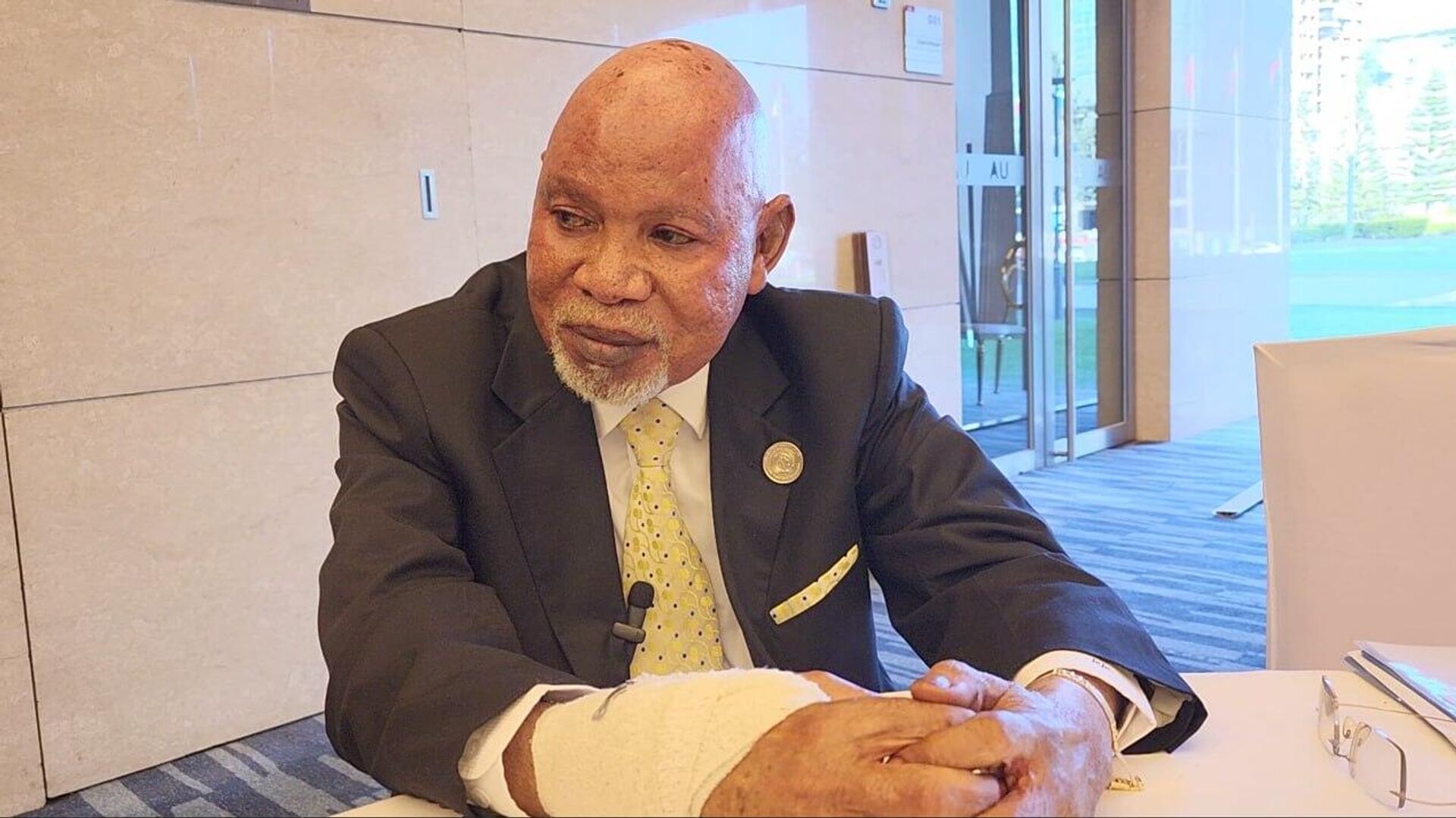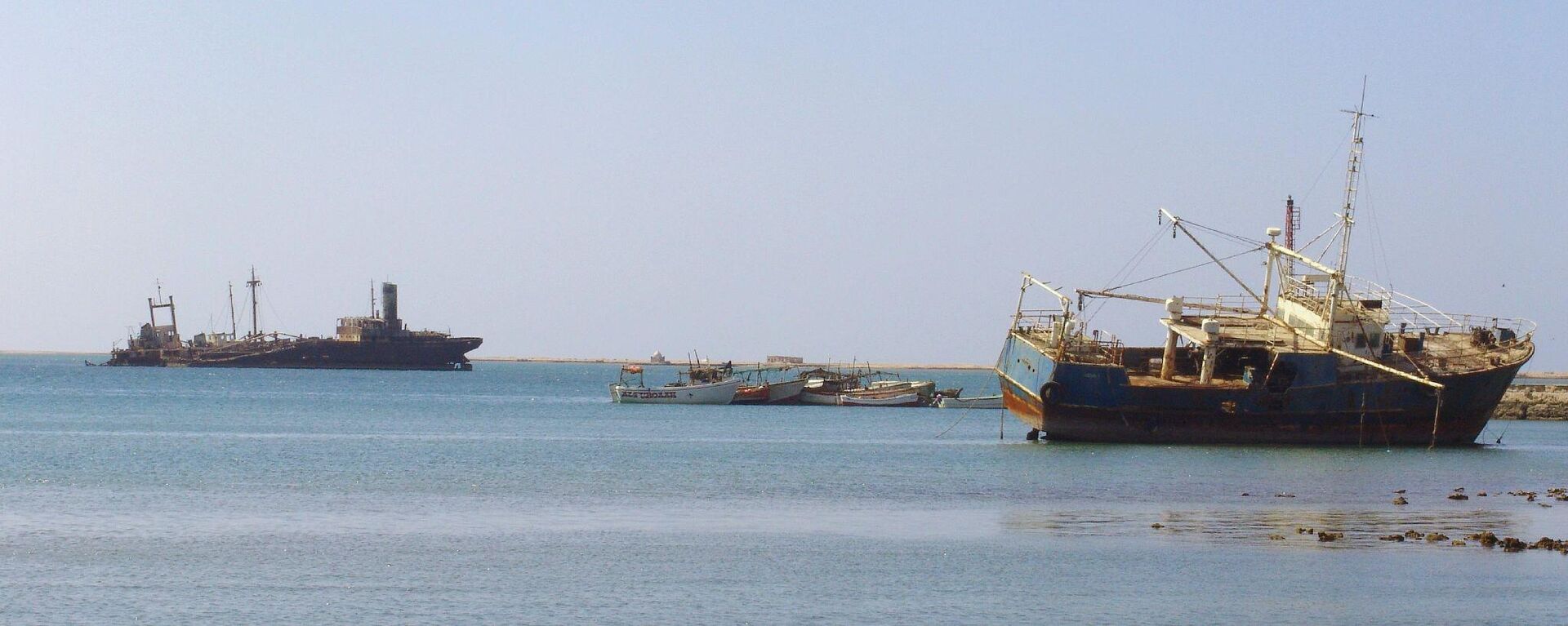https://en.sputniknews.africa/20240219/key-points-from-ugandas-fm-on-russia-africa-coop-western-biolabs-and-conflict-resolution-1065152091.html
Key Points From Uganda's FM on Russia-Africa Cooperation, Western Biolabs and Conflict Resolution
Key Points From Uganda's FM on Russia-Africa Cooperation, Western Biolabs and Conflict Resolution
Sputnik Africa
Last week, Russian Foreign Minister Sergey Lavrov said that Moscow is actively working to expand its diplomatic, economic, and humanitarian presence in Africa... 19.02.2024, Sputnik Africa
2024-02-19T16:50+0100
2024-02-19T16:50+0100
2024-02-19T18:15+0100
opinion
uganda
east africa
africa in details
russia-africa cooperation
jeje odongo
sergey lavrov
russia
somalia
brics
https://cdn1.img.sputniknews.africa/img/07e8/02/13/1065154341_0:0:1270:714_1920x0_80_0_0_59e6e2adb4b771c8c8d9868f08b02ab0.jpg
Interaction between Russia and Africa, as well as Russia and Uganda in particular, in various areas of the economy, was one of the key topics in Sputnik’s interview with the Minister of International Affairs of Uganda, Haji Abubaker Jeje Odongo.The official pointed out that Russia "was upfront and willing to cooperate with various African countries" to facilitate their development "in light of the inadequacies of the current international financial architecture." For example, Russia and Uganda are discussing cooperation in the oil and energy industries, as well as in the area of satellite technology.Odongo also stressed that the provision of free grain to several African countries was "gracious" and "magnanimous."Moreover, Uganda would like to join Russia's financial messaging system — an alternative to Swift network. The minister explained that the Russian financial tool could help Africa escape the Western "blackmail:" as soon as an African state has political views that contradict the West, the latter can deprive a state from financial resources that have no alternatives.Continuing on the topic of economics, Odongo added that his country "would be very happy" to use cryptocurrencies and digital currencies for mutual settlements with Russia.Moving further, the minister elaborated on the Uganda's willingness to provide Russia with coffee at more affordable prices, saying that the two countries could directly trade the drink so beloved by Russians.The guest added that Ugandan producers would like to explore the Russian market and see what opportunities it presents.Of course, the topic of BRICS and the participation of African countries in it did not go unnoticed. Minister Odongo stated that the bloc can help his country with development finance.Concluding the conversation on a number of topics related to Russia, Sputnik discussed two more issues with Odongo.Speaking on the African Initiative to find a resolution of the Ukraine crisis, the official said that African countries are waiting for a response from South Africa on the initiative, as this country is the coordinator in this matter.The second issue was the Olympic Committee's ban of Russian athletes from participating in many games. Odongo called the ban "extremely unfortunate," adding that politics should not interfere with the sport.The guest, however, reckoned that the creation of an alternative sports committee would "only increase the separation of athletes," though Odongo left room for thoughts on evaluating such an idea.The allegations of possible biological laboratories operating in Kenya, Tanzania, Nigeria, and Uganda carrying out potentially dangerous activities for the populations of these countries were also discussed during the interview.The last section of the interview was a discussion of intra-African problems, particularly the recent crisis between Ethiopia and Somalia, as well as the conflict in Sudan.Regarding the first issue, the foreign minister noted that African nations and organizations are in search for a peaceful solution to this crisis, considering that the position of Somalia is "very clear," which leaves no room for discussion.Resolving the worsening conflict in Sudan, according to Odongo, is a more difficult task, since the parties have not yet reached face-to-face contact, which is required for a ceasefire — the first phase of a three-step solution proposed by Uganda that also includes separation of forces and a comprehensive political negotiation process.The minister, however, noted that he "might be having an opportunity to interact directly with one of the parties in finding a solution to this problem," without revealing, however, which party he might meet.Last but not least, Odongo pointed out some tendencies in the civil society, which seems to "imagine that they would now be the ones to take over once there is a settlement of these problems" and also might be reluctant to interact with all the parties involved in the conflict, which is a recipe for disaster, in the minister's opinion.
https://en.sputniknews.africa/20240219/uganda-welcomes-alternative-to-swift-to-counter-western-blackmail-foreign-minister-says-1065142852.html
https://en.sputniknews.africa/20231103/what-are-us-motives-for-deploying-its-biolabs-in-africa-1063281494.html
https://en.sputniknews.africa/20240219/african-states-seeking-peaceful-solution-to-ethiopia-somalia-crisis-kampala-says-1065142172.html
uganda
east africa
russia
somalia
sudan
ethiopia
somaliland
Sputnik Africa
feedback@sputniknews.com
+74956456601
MIA „Rossiya Segodnya“
2024
Christina Glazkova
https://cdn1.img.sputniknews.africa/img/07e7/0b/07/1063380906_0:0:673:674_100x100_80_0_0_79628b4d0cd9f29291a57aa13bbf9e7a.jpg
Christina Glazkova
https://cdn1.img.sputniknews.africa/img/07e7/0b/07/1063380906_0:0:673:674_100x100_80_0_0_79628b4d0cd9f29291a57aa13bbf9e7a.jpg
News
en_EN
Sputnik Africa
feedback@sputniknews.com
+74956456601
MIA „Rossiya Segodnya“
Sputnik Africa
feedback@sputniknews.com
+74956456601
MIA „Rossiya Segodnya“
Christina Glazkova
https://cdn1.img.sputniknews.africa/img/07e7/0b/07/1063380906_0:0:673:674_100x100_80_0_0_79628b4d0cd9f29291a57aa13bbf9e7a.jpg
uganda, east africa, africa in details, russia-africa cooperation, jeje odongo, sergey lavrov, russia, somalia, brics, sputnik, economy, conflict, sudan, ethiopia, somaliland, trade, development, sport, politics, swift, digital coins
uganda, east africa, africa in details, russia-africa cooperation, jeje odongo, sergey lavrov, russia, somalia, brics, sputnik, economy, conflict, sudan, ethiopia, somaliland, trade, development, sport, politics, swift, digital coins
Key Points From Uganda's FM on Russia-Africa Cooperation, Western Biolabs and Conflict Resolution
16:50 19.02.2024 (Updated: 18:15 19.02.2024) Christina Glazkova
Writer / Editor
Exclusive
Last week, Russian Foreign Minister Sergey Lavrov said that Moscow is actively working to expand its diplomatic, economic, and humanitarian presence in Africa. This and other topics were discussed during a Sputnik's interview with Lavrov's Ugandan counterpart, Haji Abubaker Jeje Odongo.
Interaction between Russia and Africa, as well as Russia and Uganda in particular, in various areas of the economy, was one of the key topics in Sputnik’s interview with the Minister of International Affairs of Uganda, Haji Abubaker Jeje Odongo.
The official pointed out that Russia "was upfront and willing to cooperate with various African countries" to
facilitate their development "in light of the inadequacies of the current international financial architecture." For example, Russia and Uganda are discussing cooperation in the oil and energy industries, as well as in the area of satellite technology.
"We are now in discussions with Russia on how we can work in our oil industry, they [Russia] are examining how they can assist us to build the oil refinery that is one of our aspirations. They're also looking at how they can help us in developing other energy sources, like the nuclear, because we have uranium deposits [...]. We are also discussing how we can work together in the area of technology, particularly satellite technology. So for us, as a country, we think it was a very productive interaction with the Russian authorities [at the second Russia Africa summit]," the minister told Sputnik.
Odongo also stressed that the
provision of free grain to several African countries was "gracious" and "magnanimous."
Moreover, Uganda would like to join Russia's financial messaging system — an alternative to Swift network. The minister explained that the Russian financial tool could help Africa escape the
Western "blackmail:" as soon as an African state has political views that contradict the West, the latter can deprive a state from financial resources that have no alternatives.
Continuing on the topic of
economics, Odongo added that his country "would be very happy" to use cryptocurrencies and digital currencies for mutual settlements with Russia.
"These are systems that are likely to be the dominant systems in the future, and it is something we can no longer ignore. It is something we are keen to study and understand. And if we find that we have the technology to implement [it], we would be very happy to do that," the politician stated.
Moving further, the minister elaborated on the Uganda's willingness to provide Russia with coffee at more affordable prices, saying that the two countries could directly trade the drink so beloved by Russians.
"We should not be told with whom we could trade and with whom we should not be able to trade. That therefore means, we could trade with our Russian partners with our coffee directly," Odongo said.
The guest added that Ugandan producers would like to explore the Russian market and see what opportunities it presents.
Of course, the topic of
BRICS and the participation of African countries in it did not go unnoticed. Minister Odongo stated that the bloc can help his country with development finance.
"The current international financial system seems broken. And as we struggle to mend it, on the horizon there are new systems, new options. And we would like to look at these new options with a lot of interest to see how they can be able to help us in our urgent need for development finance," the minister stated.
Concluding the conversation on a number of topics related to Russia, Sputnik discussed two more issues with Odongo.
Speaking on the African Initiative to find a resolution of the Ukraine crisis, the official said that African countries are waiting for a response from
South Africa on the initiative, as this country is the coordinator in this matter.
The second issue was the Olympic Committee's
ban of Russian athletes from participating in many games. Odongo called the ban "extremely unfortunate," adding that politics should not interfere with the sport.
"Political disagreements between Russia and the West should not be used against the innocent athletes who are just happy to practice their gift," the minister pointed out.
The guest, however, reckoned that the creation of an alternative sports committee would "only increase the separation of athletes," though Odongo left room for thoughts on evaluating such an idea.
The allegations of possible
biological laboratories operating in Kenya, Tanzania,
Nigeria, and Uganda carrying out potentially dangerous activities for the populations of these countries were also discussed during the interview.
The politician said that he's not aware of such labs, but Uganda would be "very keen" to "acquire the capacity to be able to detect and investigate organisms that are considered dangerous in order to be able to determine their origin, their veracity, and certainly the impact anticipated on the population."
The last section of the interview was a discussion of intra-African problems, particularly the recent crisis between Ethiopia and Somalia, as well as the conflict in Sudan.
Regarding the first issue, the foreign minister noted that African nations and organizations are in search for a peaceful solution to this crisis, considering that the position of Somalia is "very clear," which leaves no room for discussion.
"So we are looking at how we can bring those positions together in order to find an amicable solution. We think it is a problem we can be able to deal," the minister said.
Resolving the worsening conflict in
Sudan, according to Odongo, is a more difficult task, since the parties have not yet reached face-to-face contact, which is required for a ceasefire — the first phase of a three-step solution proposed by
Uganda that also includes separation of forces and a comprehensive political negotiation process.
The minister, however, noted that he "might be having an opportunity to interact directly with one of the parties in finding a solution to this problem," without revealing, however, which party he might meet.
Last but not least, Odongo pointed out some tendencies in the civil society, which seems to "imagine that they would now be the ones to take over once there is a settlement of these problems" and also might be reluctant to interact with all the parties involved in the conflict, which is a recipe for disaster, in the minister's opinion.
"Elements within the [...] civilian population are beginning to seem to think that it would not be prudent to interact with parties like the NCP [National Congress Party], the Islamists, the former President Bashir group. In my view, that would be a recipe for failure. You cannot begin to isolate people in this kind of agreement, because then you will force them into hardening their positions in order to defend their turf. I think it would be prudent to remain open and let everybody be involved in this process," the guest concluded.





